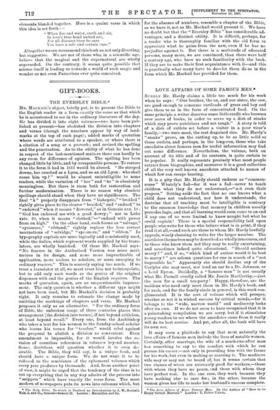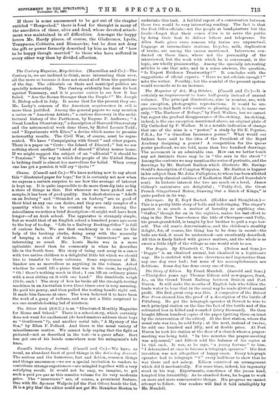LOVE AFFAIRS OF SOME FAMOUS MEN.*
SURELY Mr. Hardy claims a little too much for his work when he says : " Our brother, the ox, and our sister, the cow, are good enough to consume cartloads of grass and hay and give them to us in the form of concentrated food. On the same principle a writer deserves some little credit who browses over acres of books, in order to serve up a dish of steaks which may prove nutritious and not tough." A story is told of a dish of cutlets set before a visitor in a poor vicar's family,—two were meat, the rest disguised rice. Mr. Hardy's "steaks" prove, on the cutting up, to be as little solid as those cutlets, and perhaps, in the long-run, those who take anecdotes about famous men for useful information may find out some difference. Nevertheless, the volume, both on account of its title and of its contents, is quite certain to be popular. It really represents precisely what most people extract from biographies, and moreover it is a good collection of all the very well known anecdotes attached to names of which few can escape hearing.
It is a pity that Mr. Hardy should endorse as "common- sense" Whately's fad—for it was a fad—never to teach children what they do not understand,—" not even their prayers." Setting aside the fact that no one knows what a child does not understand, nor how it understands, the doctrine that all teaching must be intelligible is contrary to the common knowledge that memory in children usually precedes logic, and that all learning would soon come to an end if any one of us were limited to know nought but what be could explain! There is a special responsibility laid upon people who write for those who believe what is in print, if they read it at all,—and such are those to whom Mr. Hardy lawfully appeals, wisely choosing to write for the larger number. The anecdotes themselves may be described as wholly innocuous, and to those who know them not they may be really entertaining, and sometimes indeed quite educational. "Should authors marry P " and, if so, " which kind of author would it be best to marry ? " are solemn questions for one in search of a "not impossible he." Apparently she should decline any of the Carlyles she may meet, nor lend an ear to a Dr. Johnson, or a Lord Byron. Decidedly, a "famous man" is not usually what Mr. Parnell cruelly called Mr. Justin MacCartbry,—just the man for a small tea-party ! Happy, therefore, are the maidens who need only meet them in Mr. Hardy's book, and for such, and for the family circle in general, is this work con- glomerated. It is the sort of volume which will prosper, whether or not it is wished success by critical minds,—for it belongs to the "wide, narrow world" and mediocrity looks after its own. If we do not seem to have recognised that it is a painstaking compilation we are sorry, but if it stimulates young readers to see where the anecdotes come from it really will do its best service. And yet, after all, the book will have its own use.
It may seem a platitude to say that most naturally the love affairs of famous men include the lives of notable women. Certainly, after marriage, the wife of a much-run-after man has something to say to the comfort with which he can pursue his career,—not only in providing him with the frame for his work, but even in making or marring it. The mediocre wife may or may not be heard of, but it seems certain that two classes of wives are extremely good for workers,—those with whom they have no peace, and those with whom they have perfect rest. In the one case, they work because they have nothing else to care for; in the other, because the woman gives her life to make her husband's success complete.
• The Love Affairs of Nome Famous Men. By the Author of " How to be Happy though Married." London: T. Fisher Unwin. If there is some amusement to be got out of the chapter entitled "Henpecked," there is food for thought in many of the anecdotes of those, alive and dead, whose devoted attach- ment was maintained in all difficulties. Amongst the happy lovers Mr. Hardy places, of course, the Gladstones, Lyells, Tennysons, Cobbetts, and Bismarcks; but he does not deny the gift or power formerly described by him as that of "how to be happy though married" to those who have suffered in every other way than by divided affection.























































 Previous page
Previous page